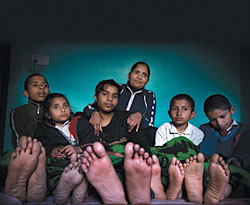|
|
The day in December 2003 started just like any other for Sabitri Regmi (pictured). She said goodbye to her husband, Amrit, principal at a local school in Bhurti, Dailekh district, and set off for work. Maoists came to his school that afternoon, sent the children home and abducted Amrit. Villagers found his body two days later, bruised and sliced open down the side, with nails hammered between his fingers, and his left arm hacked off.
The Maoists had threatened Sabitri's family before. They had robbed her small shop and at night they used to demand food. More recently they had accused Amrit of being an informer. "I was scared for his life and for the safety of my family, but he believed that we had nothing to hide," remembers Sabitri.
For a while after his murder, Sabitri and her six children received protection from the small army camp nearby. "A few months later, the officers came and said they could not protect me in the village any more," she said. "I didn't even have time to pack, I grabbed my children and ran to the place where the army chopper was waiting for us to bring us to Kathmandu."
Today she shares a dingy, cramped room with her children. They eat and sleep, and the children do their homework, in the small congested space which is mostly filled by two rickety beds. The building they now call home is full of families displaced by the war. Sabitri has received compensation of Rs 165,000 from the state, and she knows the government passed legislation last year to assist internally displaced people like herself, but she does not know the details.
In fact, although the published policy is fairly comprehensive-covering registration, medical treatment, housing, employment and counselling-it remains worthless until the government approves directives on how to implement it, says Suresh Pandit of the Norwegian Refugee Council. The Ministry of Peace and Reconstruction says the directives are at the final approval stage, but the NRC complains that every day of delay means added hardship for victims from both sides of the conflict, and delays in their rehabilitation and safe return home.
"I'd rather live in dignity at home in my village," Sabitri says. "Life is hard in Kathmandu." She has banded together with 30 other war widows to do odd jobs. "We are not ashamed to do anything. We carry bricks and sand, make candles and incense-anything to feed our children."
The IDP policy gives those displaced by the war the choice of returning home, staying where they are, or being rehoused in a location of their choice within Nepal. Last September, the Ministry of Peace and Reconstruction began providing packages to help those wishing to return home. IDPs with identification documents could receive free transport home as well as a food allowance, compensation to help refurbish their old homes, money for education and an allowance to help them set up a small business.
But humanitarian organisations working with the IDPs say this does not assist those who do not want to go home. Many have gone through the process and collected their allowances, but have not gone home.
"The government is in such a hurry to give away the Peace Fund money, they think that the problem is solved when the money is handed out to the IDPs," says rights officer Geeta Gautam from Insec, Nepal.
Durga Nidhi Sharma, Joint Secretary at the Ministry of Peace, says relief packages are being planned for those who don't want to go home. But Pandit at the NRC says some of the complications that have arisen with the disbursement of IDPs' allowances could have been avoided easily if the different relief packages had been offered at the same time.
Across town in Katunje, 33-year-old Dolma Lama starts her working day at a small garment factory. Her husband, a Maoist fighter, died in crossfire five years ago. For the last three years she has been living in Kathmandu with her three children, and now has no desire to go home to Sindhupalchok. She says she would rather continue working her 10-hour shifts in Kathmandu. "A little money would have helped with the children's education, and I wouldn't have to work non-stop like this. But where do I go, who do I ask, how and when will I get the money?"



